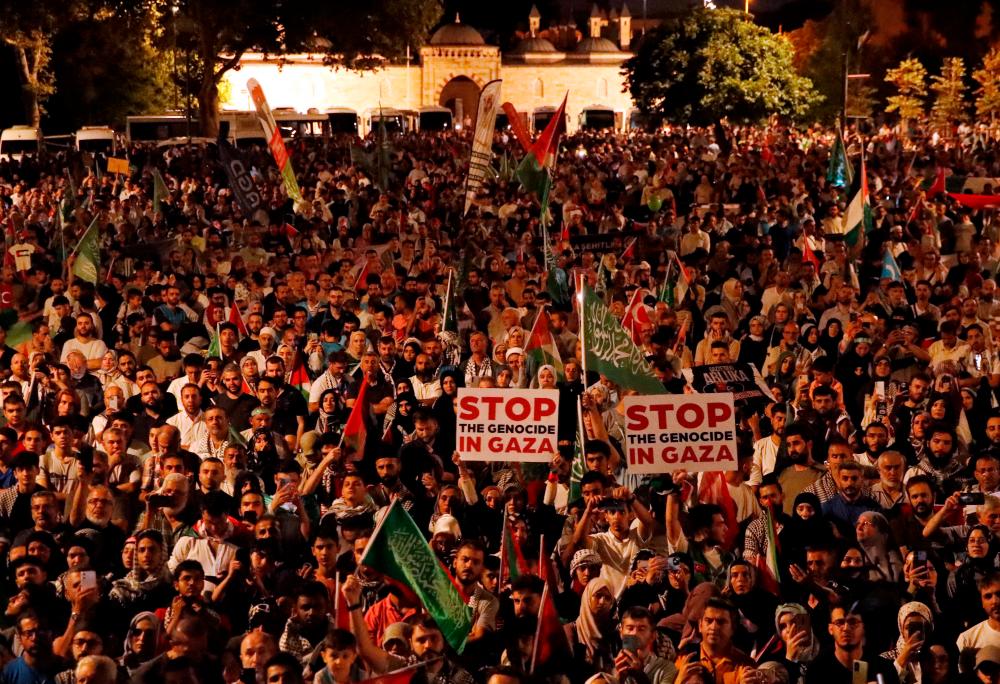CAIRO/DUBAI: Hamas leader Ismail Haniyeh was assassinated in the Iranian capital Tehran early on Wednesday morning, an attack that drew threats of revenge on Israel and fuelled further concern that the conflict in Gaza was turning into a wider Middle East war.
The Palestinian Islamist militant group and Iran’s Revolutionary Guards confirmed Haniyeh’s death. The Guards said it took place hours after he attended a swearing-in ceremony for Iran’s new president.
Although the strike on Haniyeh was widely assumed to have been carried out by Israel, Prime Minister Benjamin Netanyahu’s government made no claim of responsibility and said it would make no comment on the killing.
Haniyeh was killed by a missile that hit him “directly” in a state guesthouse where he was staying, senior Hamas official Khalil Al-Hayya told a news conference in Tehran, quoting witnesses who were with Haniyeh.
Haniyeh, normally based in Qatar, had been the face of Hamas’ international diplomacy as the war set off by the Hamas-led attack on Israel on Oct. 7 has raged in Gaza. He had been taking part in internationally brokered indirect talks on reaching a ceasefire in the Palestinian enclave.
Netanyahu made no mention of Haniyeh’s killing in a televised statement on Wednesday evening but said Israel had delivered crushing blows to Iran’s proxies of late, including Hamas and Hezbollah, and would respond forcefully to any attack.
“We are prepared for any scenario and we will stand united and determined against any threat. Israel will exact a heavy price for any aggression against us from any arena,“ he said.
The latest events appear to set back chances of any imminent ceasefire agreement in the nearly 10-month-old war in Gaza between Israel and the Iran-backed Hamas.
Hamas’ armed wing said in a statement Haniyeh’s killing would “take the battle to new dimensions and have major repercussions”. Vowing to retaliate, Iran declared three days of national mourning and said the U.S. bore responsibility because of its support for Israel.
In Turkey, thousands of pro-Palestinian demonstrators marched through the streets of central Istanbul late on Wednesday to protest Haniyeh’s killing.
Protesters in Istanbul’s Fatih district held posters with Haniyeh’s photo, chanted “murderer Israel, get out of Palestine” and waved Turkish and Palestinian flags.
Washington expressed concern about the potential for escalation. But White House national security spokesperson John Kirby said the U.S. did not see that as imminent or inevitable and was working to prevent it from happening.
The risks “are certainly up right now. They don’t make the task of de-escalation, deterrence and dissuasion - which is the goal - any less complicated,“ he told reporters.
The U.S. advised citizens not to travel to Lebanon, and two U.S. airlines, United and Delta, paused flights to Tel Aviv.
The assassination occurred less than 24 hours after Israel said it had killed Hezbollah’s most senior military commander in retaliation for a deadly rocket strike in the Israeli-occupied Golan Heights.
Hezbollah confirmed that senior military commander Fuad Shukr was killed by an Israeli airstrike in a Beirut suburb.
Seven people were killed and 78 wounded in the Beirut strike, Lebanese network Tele Liban reported on Wednesday, citing the civil defence authority. Iranian state media said an Iranian military adviser was among the dead.
ISRAEL INVITES ‘HARSH PUNISHMENT’, KHAMENEI SAYS
Iran’s Supreme Leader Ayatollah Ali Khamenei said Israel had provided the grounds for “harsh punishment for itself” and it was Tehran’s duty to avenge Haniyeh’s death. Iranian forces have already made strikes directly on Israel earlier in the Gaza war.
Haniyeh’s most likely successor is Khaled Meshaal, his deputy-in-exile who lives in Qatar, analysts and Hamas officials said.
Israeli government spokesperson David Mencer told journalists that Israel was committed to Gaza ceasefire negotiations and securing the release of Israeli hostages held by Palestinian militants in Gaza.
U.S. Secretary of State Antony Blinken, in Singapore, sidestepped a question on Haniyeh’s killing, saying a ceasefire deal in Gaza was key to avoiding wider regional escalation. He told Channel News Asia that the U.S. had neither been aware of nor involved in the killing.
Qatar, which along with Egypt has been brokering talks aimed at halting the fighting in Gaza, condemned Haniyeh’s killing.
“How can mediation succeed when one party assassinates the negotiator on other side?” Prime Minister Sheikh Mohammed bin Abdulrahman Al Thani said on X.
In Washington, Kirby said the ceasefire process had not been “completely torpedoed,“ adding that “we still believe the deal on the table is worth pursuing.”
Israel launched its offensive in Gaza after Hamas-led fighters on Oct. 7 killed about 1,200 people in southern Israel and took some 250 hostages, Israeli tallies say.
Nearly 10 months of Israel’s onslaught in the coastal enclave has killed more than 39,400 people, according to Gaza health officials, and left more than 2 million in a humanitarian crisis.
While the mood was buoyant in Israel, residents in besieged Gaza feared Haniyeh’s death would prolong the fighting.
“This news is scary. We feel that he was like a father to us,“ said Gaza resident Hachem Al-Saati.









